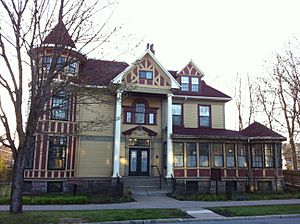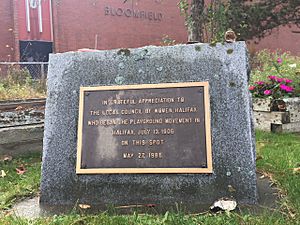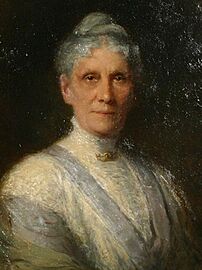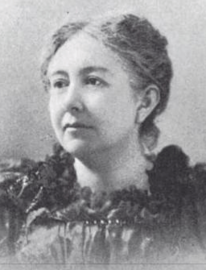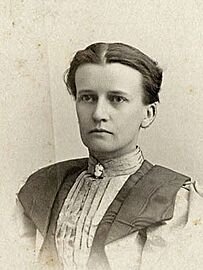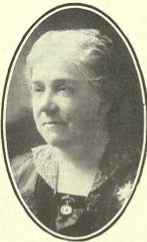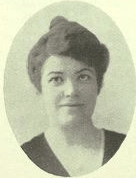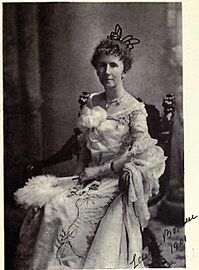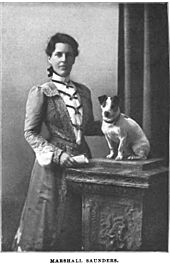Local Council of Women of Halifax facts for kids
The Local Council of Women of Halifax (LCWH) is a group in Halifax, Nova Scotia, that has worked for over a century to make life better for women and children. Their most famous achievement was a 24-year fight to win women the right to vote, which they finally did in 1918.
Five amazing women were at the heart of this group's leadership:
- Anna Leonowens, who is famous from the story The King and I
- Edith Archibald, who later became the leader of the national council
- Eliza Ritchie, a university professor and trailblazer
- Agnes Dennis, who was president of the council for 14 years
- May Sexton, a successful business owner
These women, sometimes called the "Nova Scotia 5," were supported by many others. Halifax businessman George Henry Wright left them his house in his will. He sadly died on the Titanic in 1912. Educator Alexander McKay was also a big supporter of the council's work.
Contents
The Fight for the Right to Vote
For many years, women in Nova Scotia were not allowed to vote in elections. This meant they had no say in who made the laws. The LCWH was determined to change this unfair rule.
Early Steps
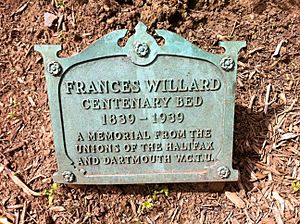
The fight for women's rights in Nova Scotia started even before the LCWH was formed. In 1851, a law was passed that officially took away women's right to vote. But women began to organize. In the 1870s and 1880s, groups like the Women’s Christian Temperance Union (WCTU) became very popular. The WCTU was one of the first major groups to officially support the cause of suffrage (the right to vote).
In 1893, Edith Archibald and other women tried to pass a law that would let women who owned property vote. The law was passed by the government leaders but was blocked by the Attorney General, James Wilberforce Longley. He was against giving women more rights and stopped their efforts for many years.
The Council Takes Action
After this defeat, the women knew they needed a stronger organization. In 1894, they formed the Local Council of Women of Halifax. Anna Leonowens was the secretary, and their main goal was to win the right to vote. They presented many petitions and bills to the government, but the fight was long and difficult.
In 1914, the women started a "Suffrage Club" in the house George Wright had left them. They used it as a headquarters for their campaign. By 1917, they presented a petition that was signed by 41 different women's groups. When the government leader still ignored them, they didn't give up. They formed the Nova Scotia Equal Franchise League to increase the pressure.
Victory at Last
Finally, on April 26, 1918, their hard work paid off. With the support of Premier George Henry Murray, the government passed the Nova Scotia Franchise Act. This law gave women in Nova Scotia the right to vote in provincial elections. Nova Scotia was the first province in Atlantic Canada to do so.
Just one month later, Canada's Prime Minister, Robert Borden, helped pass a law that gave most women across Canada the right to vote in federal elections. His wife, Laura Bond, was a former president of the LCWH.
Lasting Impact on Halifax
The LCWH did much more than just fight for the vote. The five main leaders helped start many important organizations that still exist today. Their work has had a lasting impact on art, education, and healthcare in Nova Scotia.
Some of the organizations they helped create include:
- The Victoria School of Art and Design (now NSCAD University)
- The Art Gallery of Nova Scotia
- The Nova Scotia Red Cross
- The Children's Hospital in Halifax (now the IWK Health Centre)
- The first women's residence at Dalhousie University
- The Victorian Order of Nurses in Halifax
- The Halifax Playground Commission
The Nova Scotia 5
These five women were the core leaders of the Local Council of Women of Halifax.
Other Important Members
Many other women played key roles in the council's success.
-
Laura Borden, wife of Prime Minister Robert Borden
-
Margaret Marshall Saunders, author of the famous book Beautiful Joe
- Charlotte McInnes
- Mary Walcott Ritchie
See also
- Feminism in Canada
- Nova Scotia Human Rights Commission
- Transition House Association of Nova Scotia
Links
- Official Website of the Council of Women, Halifax: http://lcwhalifax.ca/
 | Madam C. J. Walker |
 | Janet Emerson Bashen |
 | Annie Turnbo Malone |
 | Maggie L. Walker |


